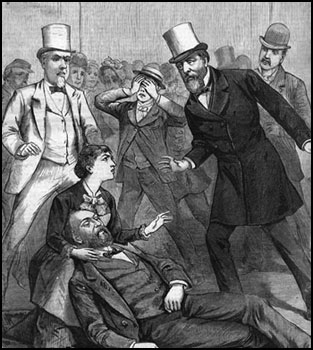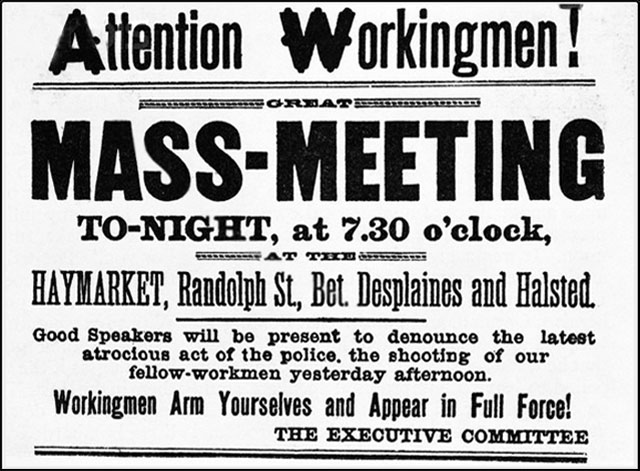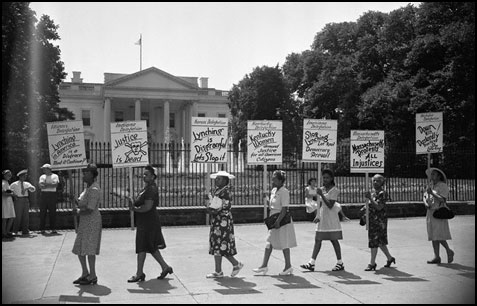
A Change in Time
“One had better die fighting injustice than die like a dog or a rat in a trap” (Ida B. Wells). The 1880s was a decade filled with assassinations, inequality, and unfairness. Events such as the Haymarket Square Affair and President James A. Garfield’s assassination caused Americans to get involved in politics. Chester Alan Arthur tried repeatedly to bring order to the government and Ida B. Wells’ dedication and insistence changed the African American society. This time period began with various problems.
In 1881 it was reported that President James A. Garfield had been assassinated. Garfield was the 20th president of the United States and served his presidency for less than a year before he was shot. Garfield was shot in Washington D.C. by Charles Guiteau, a lawyer, politician, and theologian who suffered as well from mental illness. After Garfield’s election, his supporters claimed government jobs; these are given after the victory of a president. Guiteau repeatedly requested for a job but was declined or never responded to. Finally, on the morning of July 2, 1881 Guiteau shot Garfield twice in a train station near Capitol Hill. He left a note stating, “The President’s tragic death was a necessity but it will unite the Republican Party and save the Republic.” Guiteau also thought that by killing Garfield, the Vice-President Chester Alan Arthur would have a spoils system and give him a government job. His conclusions were inaccurate because the corrupt spoils system only led Arthur to establish the merit system.
Chester Alan Arthur was president from 1881- 1885, after Garfield’s assassination. During his presidency, Arthur signed the Pendleton Act in 1883. This act helped take 1,000 of government jobs out of politics and protected employees from being fired from them because of their political decisions. On the other hand, due to this act, officials could no longer pressure their employees to contribute to campaigns, which made the officials turn to other funds for support. President Arthur also signed the Chinese Exclusion Act in 1882 that prevented Chinese from immigrating to the U.S. The Chinese communities stopped growing and were excluded from society. It affected the Chinese immigrants who were already living in the U.S. as well because they were either deported or put in prison. This act lasted for about ten years. Many felt this was unjust.
Injustice spread through the years, including 1886. The American Federation of Labor (AFL) made strikes all over the nation where employers would refuse to make a workday eight  hours. The Haymarket Square affair took place in Chicago at a public meeting in Haymarket Square. Anarchists were having a peaceful meeting when all of a sudden a bomb exploded wounding 66 policemen, seven of them died. The police fired killing several and wounding 200. It was unknown who threw the bomb but the authorities arrested spies and seven anarchist. Only one of the accused anarchist, was present at the Haymarket Square affair but the jury found all seven of them guilty and sentenced them to death. People around the world protested against these harsh accusations.
hours. The Haymarket Square affair took place in Chicago at a public meeting in Haymarket Square. Anarchists were having a peaceful meeting when all of a sudden a bomb exploded wounding 66 policemen, seven of them died. The police fired killing several and wounding 200. It was unknown who threw the bomb but the authorities arrested spies and seven anarchist. Only one of the accused anarchist, was present at the Haymarket Square affair but the jury found all seven of them guilty and sentenced them to death. People around the world protested against these harsh accusations.
Certain races also experienced these harsh injustices. Ida b. Wells dedicated more than half of her  life trying to get equal rights for African Americans. She, a black woman, refused to give up her seat for a white man in a train. She fought for women and people of color. Also, she was able to participate in anti-lynching protest. Later on, she challenged segregation by filing a lawsuit against the Chesapeake and Ohio Railroad and was victorious until the Tennessee Supreme Court overruled the lower court in 1887. In that same year, many Native Americans experienced segregation as well. They were divided into groups through the Dawes Act of 1887. The act was meant to take the tribal land and divide them into allotments to create more Native American families. Instead, the Native Americans were largely affected. Because of their inability to adapt to the system, their unity and culture was slowly diminishing. Indians that lived in the Plains could no longer sustain a way of life because they depended so much on buffalo that when the buffalo was wiped out, they were not able to obtain clothing, food, or shelter. This forced them to adapt American livings but many did not want to compromise with the idea of changing their lifestyles and culture.
life trying to get equal rights for African Americans. She, a black woman, refused to give up her seat for a white man in a train. She fought for women and people of color. Also, she was able to participate in anti-lynching protest. Later on, she challenged segregation by filing a lawsuit against the Chesapeake and Ohio Railroad and was victorious until the Tennessee Supreme Court overruled the lower court in 1887. In that same year, many Native Americans experienced segregation as well. They were divided into groups through the Dawes Act of 1887. The act was meant to take the tribal land and divide them into allotments to create more Native American families. Instead, the Native Americans were largely affected. Because of their inability to adapt to the system, their unity and culture was slowly diminishing. Indians that lived in the Plains could no longer sustain a way of life because they depended so much on buffalo that when the buffalo was wiped out, they were not able to obtain clothing, food, or shelter. This forced them to adapt American livings but many did not want to compromise with the idea of changing their lifestyles and culture.
Overall, this decade could be described as a decade of injustice. The Dawes Act and Chinese Exclusion Act made America look bad as discriminative. Garfield’s assassination and the Haymarket affair shocked many into reality. And, Ida B. Wells’ struggles proved the inequality and injustice that was brought amongst the people of color. This decade had positives events as well but the injustices shown throughout the 1880s changed the American point of view and its history.
Bibliography:
http://en.wikipedia.org/wiki/Ida_B._Wells
http://en.wikipedia.org/wiki/Chester_A._Arthur
http://en.wikipedia.org/wiki/James_A._Garfield_assassination
http://en.wikipedia.org/wiki/Haymarket_Riot